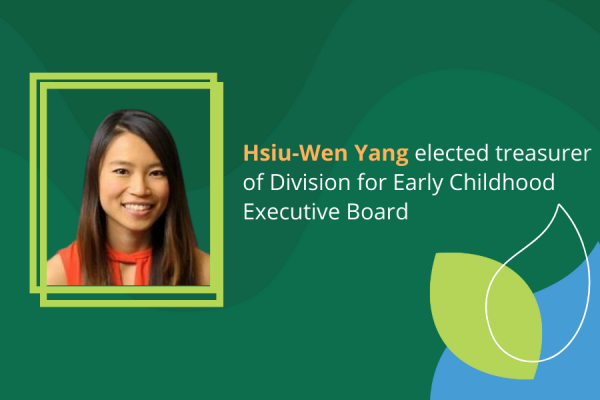
Q&A With Hsiu-Wen Yang, PhD
Hsiu-Wen Yang, PhD, a technical assistance specialist at the UNC Frank Porter Graham Child Development Institute (FPG), has been elected to the Executive Board of the Division for Early Childhood. Yang’s term as the new treasurer will begin in July 2022.
We recently spoke to Yang about her current work at FPG—learn more in the updated article below.
What is your role at FPG?
From 2019 to 2021, I was a postdoctoral scholar working with the STEMIE team to support STEM learning for young children with disabilities. And now, I am a technical assistance specialist/research investigator working with both STEMIE and NC-ELN to develop infrastructure to provide evidence-based support and technical assistance to families, practitioners, local education agencies, and school leaders. And, recently, I have been elected as a treasure to the Division for Early childhood Executive board.
What did you learn as an occupational therapist that furthered your path?
I got my bachelor's and master's degrees in occupational therapy and worked as a pediatric occupational therapist in Taiwan for several years. While working as an occupational therapist, I found that many families struggled to support their children's learning at home. Families play a key role in their children's development. They need information that won't overwhelm them, and they need experts who can help them understand what they're hearing from their doctors or other practitioners. I was eager to find out the effective ways to engage families and maximize children's learning outcomes.
This is what inspired me to go back to school and get my PhD in early childhood special education. I wanted to know how to support young children with disabilities in a variety of settings. Children can receive support at school and with professionals, but they also need support in their homes.
Why did you choose FPG for your postdoctoral work?
FPG is an internationally recognized research institution focused on child development, and I'm really interested in working in research, developing my own ideas, and exploring them through grants and projects. One of the main reasons I wanted to come to FPG for this work is how their research and policy division, implementation science division and technical assistance division work together to close the gap between research and practice.
How did your work with STEMIE as a postdoctoral scholar inform the work you want to do?
I learned so much from STEMIE. When I work with families and practitioners, I like to consider the most effective ways to deliver scientific information in order to support them as they access, understand, and apply this information in real life.
Working with STEMIE as a postdoctoral scholar has helped me learn different ways to engage stakeholders (e.g., practitioners, families, school administrators) in solving problems. The experience has motivated me to sharpen my skills and knowledge in participatory action research. I look forward to applying what I learned from STEMIE to ensure the work I do addresses stakeholders needs, priorities, and concerns.
What are you working on now with STEMIE—and how has your work changed over the past year?
Right now, I am working on developing protocols to support STEM learning for infants and toddlers with developmental delays at home. With the experiences of working with STEMIE and NCELN, I have become increasingly interested in engaging stakeholders in the research and knowledge translation process. I look forward to applying what I learned throughout my postdoctoral journey and starting to make a difference in the education.
